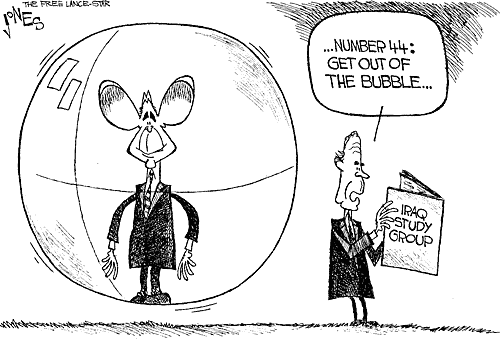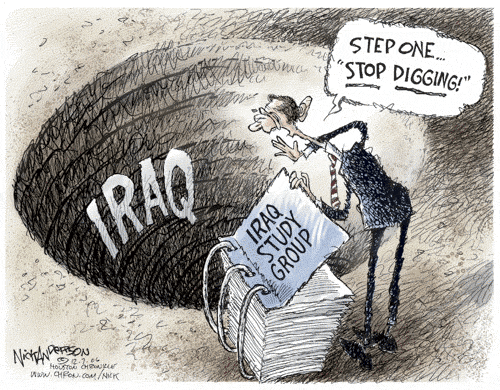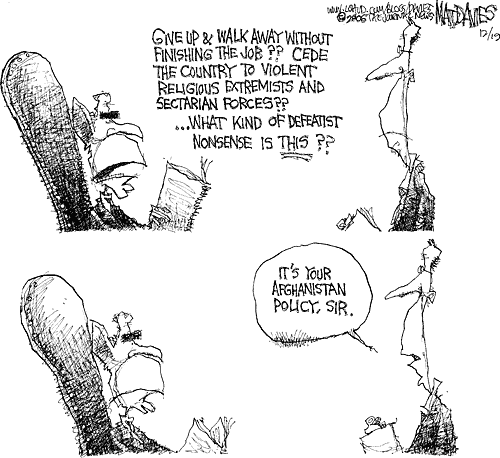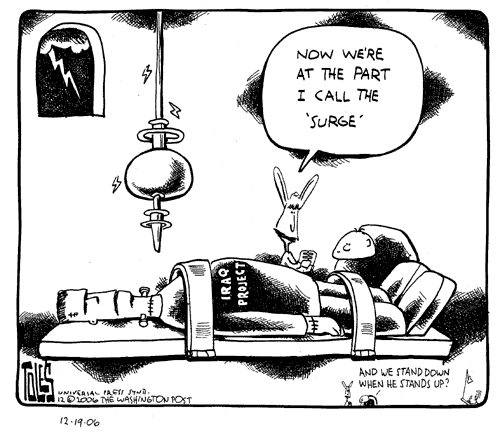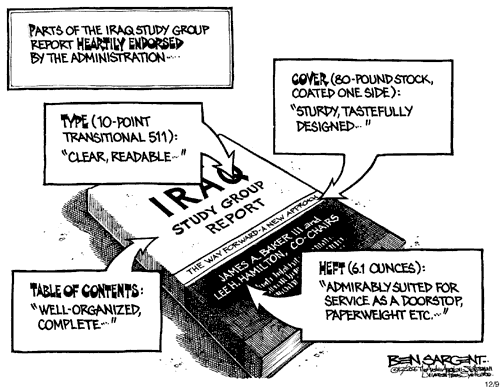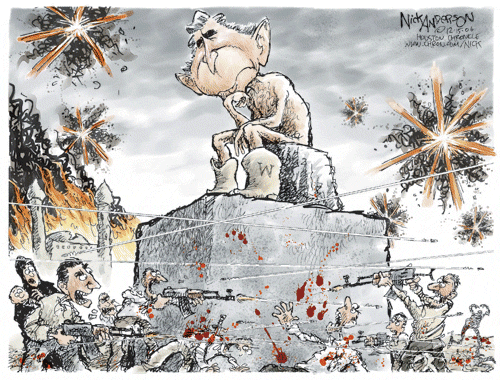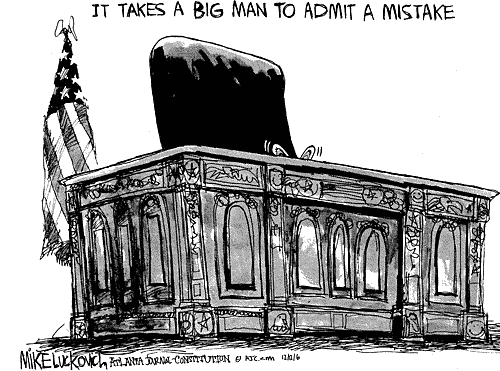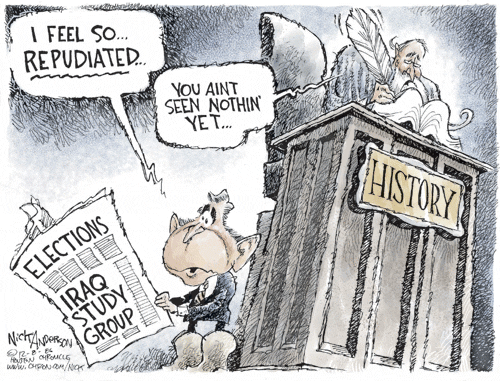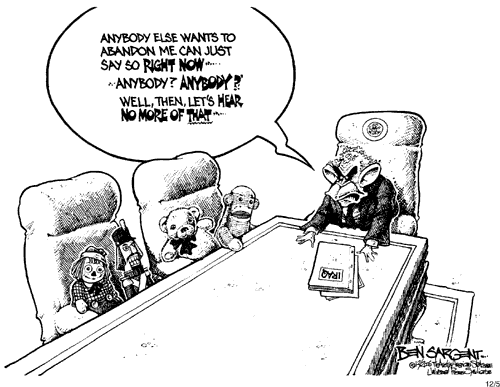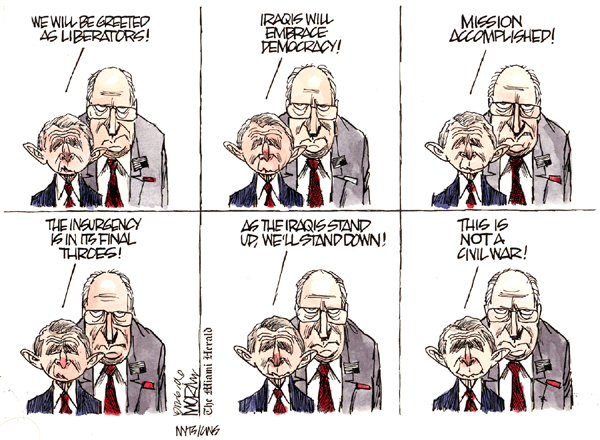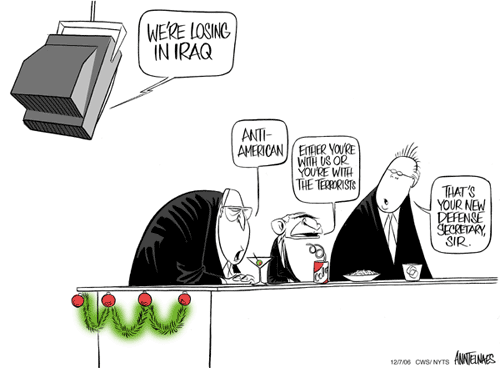Iraq Study Group's Fatal Flaw
Robert Dreyfuss
December 08, 2006
Robert Dreyfuss is an Alexandria, Va.-based writer specializing in politics and national security issues. He is the author of Devil's Game: How the United States Helped Unleash Fundamentalist Islam (Henry Holt/Metropolitan Books, 2005), a contributing editor at The Nation and a writer for Mother Jones, The American Prospect and Rolling Stone. He can be reached through his website, www.robertdreyfuss.com. This article first appeared in The Nation .
There's good news and bad news in the long-awaited report of the Iraq Study Group. Happily, it starts the United States down the path of withdrawal. Unhappily, its most basic premise—that the United States can somehow support the nonexistent Iraqi government and bolster its viciously sectarian armed forces—is fatally flawed.
Let's start with the good news. The ISG has delivered a stunning body blow to the White House. Stripped of its details, the ISG's message is that President Bush's Iraq policy is a complete failure that has brought Iraq and the Middle East to the brink of catastrophe. As a result, the United States must execute an about-face. Almost immediately, the United States must begin withdrawing virtually all of its combat forces from Iraq, a withdrawal that should be completed early in 2008. At the same time, it says, the United States will have to scramble to launch a diplomatic effort involving Iraq's neighbors—including Syria and Iran—the Arab League, the UN, the Organization of the Islamic Conference, and other world powers to prevent Iraq from spiraling into chaos.
Further, says the ISG report—which was handed personally to Bush by Hamilton and his co-chairman, former Secretary of State Jim Baker, Wednesday—the United States must renounce any idea of permanent bases in Iraq, "reject the notion that the United States seeks to control Iraq's oil," and urgently seek national reconciliation in Iraq. To that latter end, the ISG proposes that the United States "must also try to talk directly to Muqtada al-Sadr, to militia leaders, and to insurgent leaders"—in other words, instead of seeking to crush the Iraqi resistance and smash Sadr's Mahdi Army, it's time to talk to them. And to top it all off, the ISG proposes a vigorous effort to restart the Palestinian-Israeli peace process.
It's hard to imagine a more sweeping rebuke to the president's disastrously misguided Middle East policy. The report breathes not one word about "victory" in Iraq. Ever the master of understatement, Baker said that the idea of staying the course in Iraq "is no longer viable."
The Baker-Hamilton report instantly isolated President Bush against a snowballing consensus among the mainstream political establishment. In a collective I-told-you-so, Democrats mostly heaped praise on the ISG report. "If the president in serious about the need for change in Iraq, he will find Democrats ready to work with him in a bipartisan fashion to find a way to end the war as quickly as possible," said Nancy Pelosi, the incoming speaker of the House, who added that the ISG report echoed virtually all of the Democrats' main talking points on Iraq.
Over on the Republican side, moderates and mainstream conservatives such as Senators Chuck Hagel, Susan Collins and Olympia Snowe also cheered its conclusions. "It gives impetus to both the Congress and hopefully the president," said Snowe. "The time has come to change our course and to support a plan… that ultimately leads to a withdrawal of troops from Iraq."
Against the emerging political consensus, Bush has no real option other than to come around. Jon Alterman, the director of the Middle East program at the Center for Strategic and International Studies (CSIS), one of four think tanks that sponsored the ISG, noted that the ISG report frees Republicans to break with Bush:
With the issuance of this report, it has become far easier to claim that one is a loyal Republican and that one differs strongly with the Bush administration on Iraq. When some Congressional Republicans did that in September, it set off a tremor. This could provoke an earthquake and leave the President very isolated if he refuses to change course.
Of course, notoriously stubborn, frighteningly ignorant of foreign affairs, still susceptible to the whisperings of Vice President Cheney, and perhaps convinced that his Middle East policy is a holy Christian mission, there's no guarantee that Bush will go along. At the news conference releasing the report, Baker explicitly refused to psychoanalyze President Bush. Later, Larry Eagleburger, who served on the ISG and who was secretary of state under former President George Bush, could only speculate on how Bush was reacting to the ISG's 142-page insult. "I was impressed with the fact that number one, he didn't make any negative remarks at all, and secondly, he didn't have a sour look on his face," he said.
But the situation is so grave, according to Baker, Hamilton, et al., that even President Bush has to get it. The United States, said Hamilton in a television interview on with Anderson Cooper on CNN, has "not months, but weeks, even days" to act to prevent possible all-out civil war and regional conflict.
Although the ISG co-chairmen were willing to say—as did Secretary of Defense Robert Gates, a former ISG member -- that the United States is not winning in Iraq, they were loathe to face the real truth: that the United States is losing; indeed, that the war is lost. Which brings us to the bad news.
Unfortunately, the Baker-Hamilton task force insists that with a precise combination of diplomacy, military action, micro-management of Iraqi politics, threats, and bribes, it is still possible to salvage, well, not victory, but "success" in Iraq, and to do so in a way that protects the "global standing of the United States." It notes that the United States must hang on to an imperial presence in the Persian Gulf, not only by maintaining several tens of thousands of troops in Iraq but substantial forces in Afghanistan, Kuwait, Qatar, Bahrain, and elsewhere in the region.
The troops remaining in Iraq would include up to 20,000 US forces to provide "training, … advice, combat assistance, and staff assistance" to Iraqi forces, plus "intelligence, transportation, air support, and logistics support," along with "rapid-reaction teams" and "special operations teams." And (on page 73 of its report) the ISG drops this a zinger, noting that it might not oppose a "surge" of U.S. forces:
We could, however, support a short-term redeployment or surge of American combat forces to stabilize Baghdad, or to speed up the training and equipping mission, if the U.S. commander in Iraq determines that such steps would be effective.
The central premise of the ISG report is fatally flawed. It proposes to support an Iraqi government that doesn't exist, and to strengthen an Iraqi army that is not a national army but an array of sectarian and ethnic militias.
It proposes to withdraw perhaps 70,000 to 100,000 U.S. combat forces by early 2008, but to quadruple U.S. trainers and other experts to strengthen the Iraqi armed forces. Problem is, those Iraqi forces are nearly entirely made up of Shiites and Kurds, including tens of thousands of Shiite militiamen and Kurdish pesh merga forces. That means that strengthening the Iraqi army simply bolsters two sides in a three-sided civil war. Baker and Hamilton say: "The primary mission of U.S. forces in Iraq should evolve to one of supporting the Iraqi army." But, they don't even try to explain how that might work, since the Iraqi army is utterly broken and filled with sectarian and ethnic loyalists.
And Iraq's government, led by the hapless Nouri al-Maliki, is a fiction. On one hand, the Baker-Hamilton task force proposes to enhance the power of the Maliki government and to give it increased control over its own armed forces. On the other hand, Baker-Hamilton warn darkly about threats and ultimatums that the United States must issue to Maliki. Yet neither incentives nor threats can work when the object of those incentives and threats is powerless. Maliki's status as a U.S. puppet, installed by an American occupation, kills any chance that he can emerge as a credible Iraqi leader.
Which brings us to the most basic flaw of the Baker-Hamilton report. In fact, the only Iraqi government that could have any credibility with large numbers of Iraqis is one that militantly opposes the U.S. occupation of Iraq, demands the withdrawal of U.S. forces on an orderly but speedy timetable, and supports the unity and integrity of the Iraqi state and nation. Between 60 percent and 80 percent of Iraqis want the United States to leave Iraq, quickly, and so do well over a hundred Iraqi members of parliament, if not an actual majority of that body. Perhaps a government that represents them could emerge on the ruins of the Maliki regime, if Maliki is forced from office or overthrown by Iraqis. There is—little reported by American media—a strong effort to create a movement across the Sunni-Shiite divide, one that could include Sadr's Mahdi Army, other Shiite parties, many Sunni leaders in the current parliament, and a large part of the Iraqi resistance.
It's too much to expect the Iraq Study Group to support the creation of an anti-American Iraqi government. Indeed, many of its commissioners seem lost in a dream of somehow recapturing the lost U.S. position in the Middle East. But regardless of the ISG's seventy-nine options, things are moving fast in Iraq. Much of Iraq, of course, is moving toward a bloody civil war, pitting sect against sect and Arab against Kurd. But there is also an Iraqi movement for a nationalist republic, one free of the American occupation imposed on it by George W. Bush in 2003. Either way, it's likely that the pace of that movement will accelerate in the weeks and months ahead.
As a result, the real value of the ISG report is that it starts the United States down the road toward a withdrawal of a major portion of the occupation army, and toward a diplomatic effort in its place. That's all to the good—and for most Americans, who won't bother reading all 79 recommendations, the only thing they will get from the news of the ISG's work is that a bunch of smart people say it's time to get out of Iraq. The rest is details. And things in Iraq are moving so fast that few, if any, of those details will ever have any impact in the real world.
Copyright © 2006 The Nation
